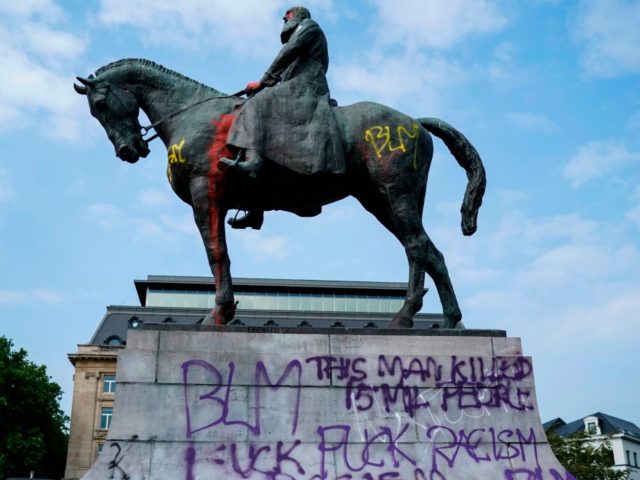Government advisors in Brussels have drawn up a plan suggesting a statue of controversial Belgian King Leopold II should be melted down and turned into a memorial for the victims of colonialism.
King Leopold II ruled Belgium from 1865 to 1909, but is most known for his notorious personal reign over the Congo between 1885 and 1908 where brutal — even by the standards of the day — rule saw millions of Congolese people perish from famine, disease, and torture.
The King’s history was recently brought into the spotlight during the Black Lives Matter June 2020 riots in the Belgian capital of Brussels where activists brandishing a Democratic Republic of Congo flag climbed the iconic statue of Leopold, others vandalised it spray painting the eyes and hands red as well as the word “pardon [French for sorry]” across his chest.
These protests-turned-riots caused Brussels’ regional government to commission a 256-page report which contained suggestions from a group of historians, architects and other specialists on how to ‘decolonise’ the Belgian capital. Among the suggestions listed is the idea a prominent statue of the former King should be melted down and recast into a new memorial, The Telegraph reports.
Brussels Burns: Riots Break out at Black Lives Matter Protests in European Union Capital https://t.co/mPUuwgJROJ
— Breitbart London (@BreitbartLondon) June 8, 2020
The report contains other suggestions from moving statues into museums, commissioning a colonial victims museum, attaching plaques to statues and renaming monuments, such as one dedicated to the “Belgian pioneers” of the colonies — located in the Parc du Cinquantenaire in central Brussels — to be renamed as a “monument to the deconstruction of Belgian colonial propaganda”.
Speaking to Breitbart London political commentator Esther Krakue labelled King Leopold II as a “brutal mercenary with seemingly no moral boundaries”, and highlighted that he was responsible for the “maiming, butchering, enslaving and outright murdering of thousands, if not millions of people in the Belgian Congo for his own personal gain”.
“And it is precisely for this reason that the statue of him should not be taken down. We do a disservice to the millions of people that suffered at the hands of his brutality when we try to erase history”, Krakue continued.
“It is an insult to impose our fragility on people who have a right to have their stories permanently embedded in the history books. How are people meant to learn about history if keep trying to doctor it to suit our mollycoddled view of the world?”, Krakue concluded.
Brussels Police to Be Trained in Islam to Foster ‘Respect’, ‘Openness’ https://t.co/BEAbIXqvy4 pic.twitter.com/UIo5DBn0im
— Breitbart London (@BreitbartLondon) January 10, 2017
Luke Doherty the Chairman of think tank the Orthodox Conservatives Group asserted the proposals prove why diversity experts should be treated with caution, and “refuse to solely rely on their misguided judgments”.
“Monuments and statues are an important part of public history that ought to initiate wider debate on lives and legacy of individuals, and their contribution to society. Therefore, we shouldn’t be willingly sanitizing history because figures from the past do not conform to our transitory, modern-day views”, Doherty said.
The campaigner also suggested that history should “challenge us” and “not be subject to intellectual vandalism”. “The theme of decolonisation is a dangerous one because it masquerades cruel attempts to revise history and re-present it inauthentically. This does justice to nobody. It’s the best way to do bad history”, he remarked.

COMMENTS
Please let us know if you're having issues with commenting.